We need to talk about Jordan
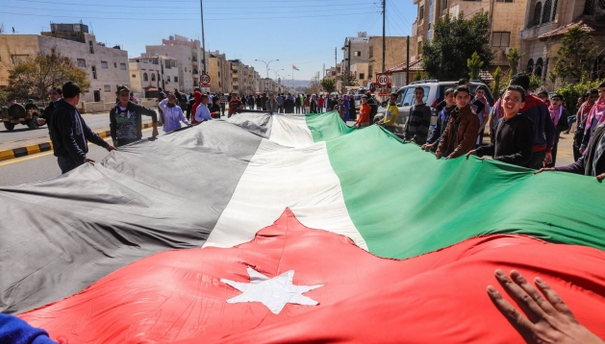
The Kingdom of Jordan occupies a strategically vital position in the Middle East, sharing borders with Saudi Arabia, Iraq, Syria, Israel, and Palestine, while maintaining a small but significant coastline along the Red Sea. As a constitutional monarchy, it is ruled by King Abdullah II, whose leadership has been central to the country’s stability in an often turbulent region. Jordan plays a crucial diplomatic role, balancing relationships with Western allies while managing complex regional tensions, particularly regarding the Israeli-Palestinian conflict and the crisis in Syria. Despite lacking major natural resources, its monarchy has maintained relative stability, making it a key player in Middle Eastern geopolitics.
Like everything else in this shitshow, this is is changing.
Jordan has long been regarded as a pillar of stability in the tumultuous Middle East. However, recent geopolitical developments, particularly under President Donald Trump's administration, have placed unprecedented strains on the kingdom's internal stability and its relationships with neighbouring countries.
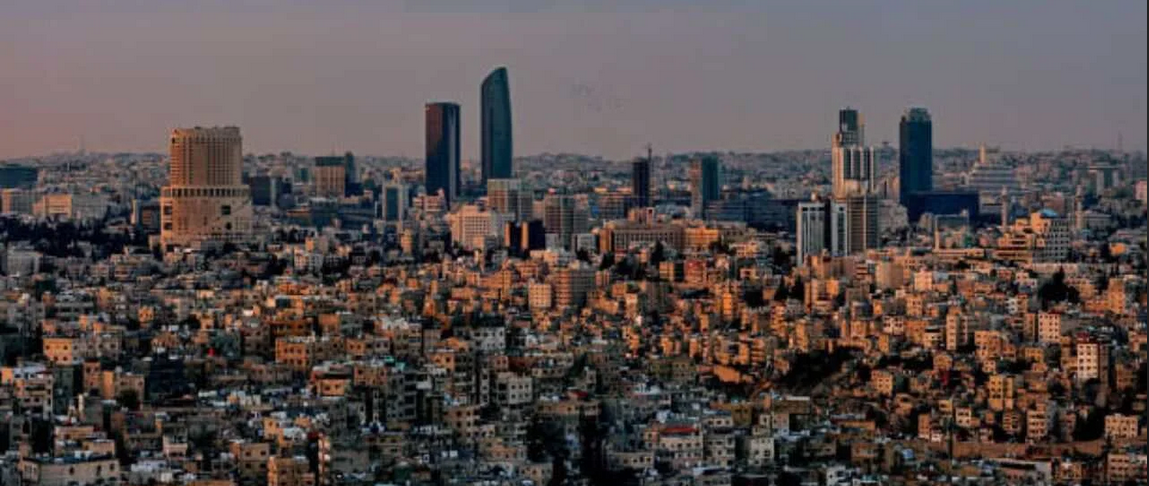
Amman, the City has been home to international conferences, political assassinations and Black September, yet without its calming influence the Middle East would be more fucked than it is.
Jordan was established in 1921 as the Emirate of Transjordan under British control, following the Ottoman Empire’s collapse after World War I. Its creation was part of Britain’s strategy to reward Hashemite leader Abdullah I for his family’s role in the Arab Revolt against the Turks. If you've ever watched Lawrence of Arabia, this was what it was about. The country’s borders were largely shaped by the 1916 Sykes-Picot Agreement, which divided the Middle East between British and French influence. If you've ever wondered why maps of the Middle-East look like someone got a ruler and scrawled over a map with a crayon, that's because that's exactly what happened: Gertrude Lowthian Bell, a British colonial freelancer from Redcar and good mate of TE Lawrence famously drew the kingdom’s boundaries with a crayon and a ruler, prioritising imperial convenience over ethnic or geographic considerations. Jordan gained full independence in 1946, but its territorial history remained fluid, particularly with its annexation of the West Bank in 1948, which was later lost to Israel in 1967.
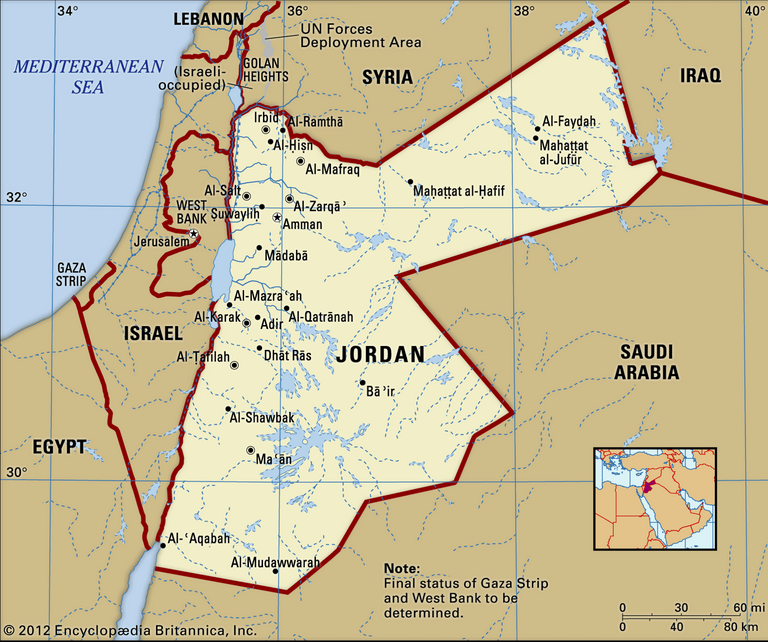
The boundaries of Jordan, drawn with a crayon & ruler by Gertrude Lowthian Bell: a Boro lass who's probably more responsible for all the shit that's gone down in the Middle East than anyone else . UTFB! .
Jordan's relationship with Israel has experienced considerable tension in recent months. While the two nations have maintained a peace treaty since 1994, Israel's intensified military actions in Gaza and the West Bank have sparked widespread condemnation from Jordanian officials and citizens alike. The humanitarian crisis in Gaza, marked by significant Palestinian casualties and displacement, has particularly fuelled public outrage in Jordan, where solidarity with Palestinians runs deep. These developments have led to increased diplomatic friction and a reevaluation of bilateral ties.
Enter the walking clusterfuck that is President Trump. The Trumpist administration has proposed the relocation of Gaza's Palestinian population to neighboring countries, including Jordan. This is blatant ethnic cleansing in the guise of a real estate deal and has understandably been met with vehement opposition from Jordanian authorities. Foreign Minister Ayman Safadi articulated the kingdom's firm stance against any forced displacement of Palestinians, emphasizing that such actions would be unacceptable and detrimental to regional stability. The Guardian+4The Guardian+4axios.com+4
Jordan has traditionally played a pivotal role in advocating for Palestinian rights and aspirations on the international stage. The kingdom's substantial Palestinian population further amplifies its vested interest in the Israeli-Palestinian conflict. President Trump's recent endorsement of Israel's aggressive strategies in Gaza, which have resulted in severe civilian casualties, deaths and displacement, has been met with alarm in Jordan. The prospect of a mass exodus of Palestinians from Gaza into neighboring countries poses a direct threat to Jordan's demographic balance and internal stability. Such forced displacement has been widely condemned as a violation of international law and an act of ethnic cleansing. The GuardianThe Guardian
And then there's the King, The Hashemite monarchy, under King Abdullah II, has historically been viewed as a stabilising force in the Middle East. However, the kingdom now faces mounting challenges. The economic strain of hosting refugees, coupled with domestic discontent over perceived governmental shortcomings, has led to increased public protests and calls for reform. The monarchy's balancing act. On the once hand maintaining alliances with Western powers while on the other addressing the aspirations and grievances of its populace, is becoming increasingly precarious. Traditionally, Jordan has taken the role of mediator and. A stabilizing entity in Middle Eastern politics that is now is under threat. The Trump administration's policies, particularly those perceived as dismissive of Palestinian rights and international law, have further isolated Jordan, challenging its diplomatic standing and effectiveness.
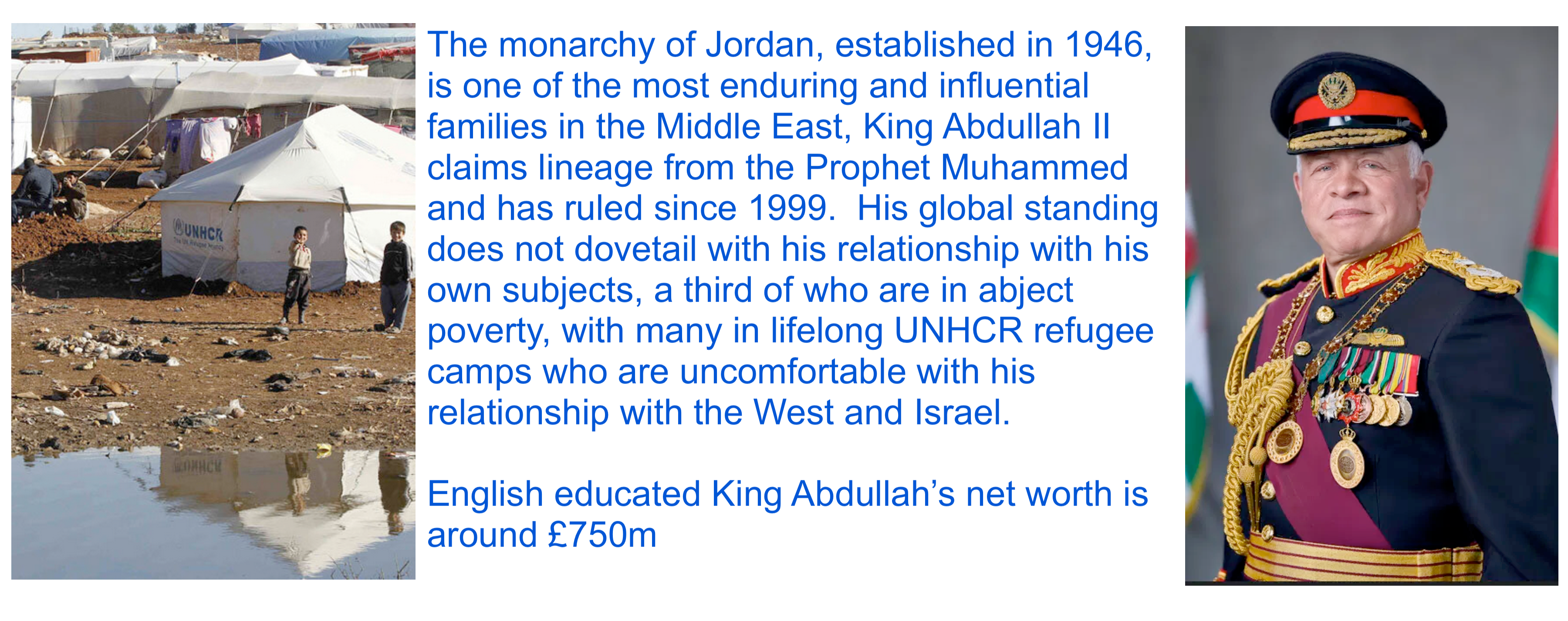
This is important. If Jordan’s role as a geopolitical stabiliser and mediator in the Middle East is under threat and this is is crucial for maintaining regional balance, particularly in conflicts involving Israel, Palestine, and Syria, then the cause and effect of Jordan changing its geopolitical roles is huge. Yet this is exactly what is happening, this position is under threat due to economic strain, internal political discontent, and shifting regional alliances, such as the Abraham Accords reducing its traditional mediation role. If the Hashemite monarchy were to fall, and this isn't just hypothetical, it could create a dangerous power vacuum, likely to be filled by extremist Islamist groups, given their influence in parts of Jordan’s opposition. This would invariably destabilise the country, threaten Western interests, monumentally piss Israel off and potentially turn Jordan into a hub for militancy, further inflaming conflicts in Israel-Palestine and Syria while worsening the refugee crisis. A radicalised Jordan could also undermine neighbouring pro-Western regimes, accelerating regional chaos. Israel would no doubt also use this as an excuse to invade and annexe parts of Jordan that it considers as Etetz Israel and use it as a springboard for doing the same to Syria.
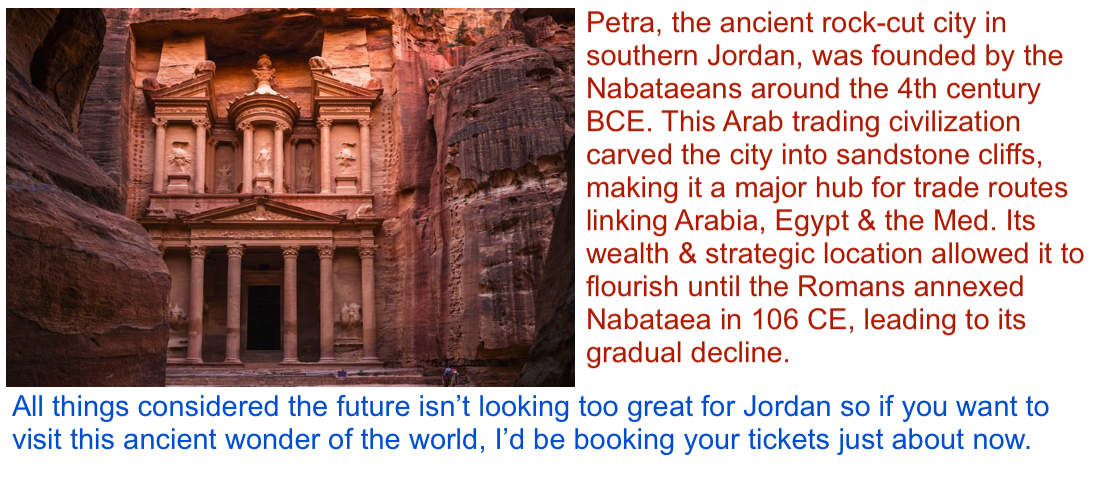
Jordan stands at a critical juncture. The confluence of aggressive U.S. foreign policies, escalating regional conflicts, and domestic challenges necessitates a reassessment of the kingdom's strategies and alliances. The international community must recognize the pivotal role Jordan plays in regional stability and support efforts to uphold its sovereignty, promote equitable solutions to the Palestinian issue, and ensure adherence to international legal standards. Failure to do so risks not only the destabilisation of Jordan but also the exacerbation of broader Middle Eastern turmoil.
If you fancy a trip to Aqaba or Petra, and I thouroughly reccommend both - I suggest you do it sooner rather than later.
The world has gone mad. If you enjoyed reading this, please feel free to look at the rest of the blogs on www.TetleysTLDR.com. They're free to view, there's no paywall, they aren't monetised and I won't ask you to buy me a coffee. Also please free to share anything you find of interest, we only get the message out if people are aware of it. Just a leftie, standing in front of another leftie, asking to be read. All the best, Tetley

